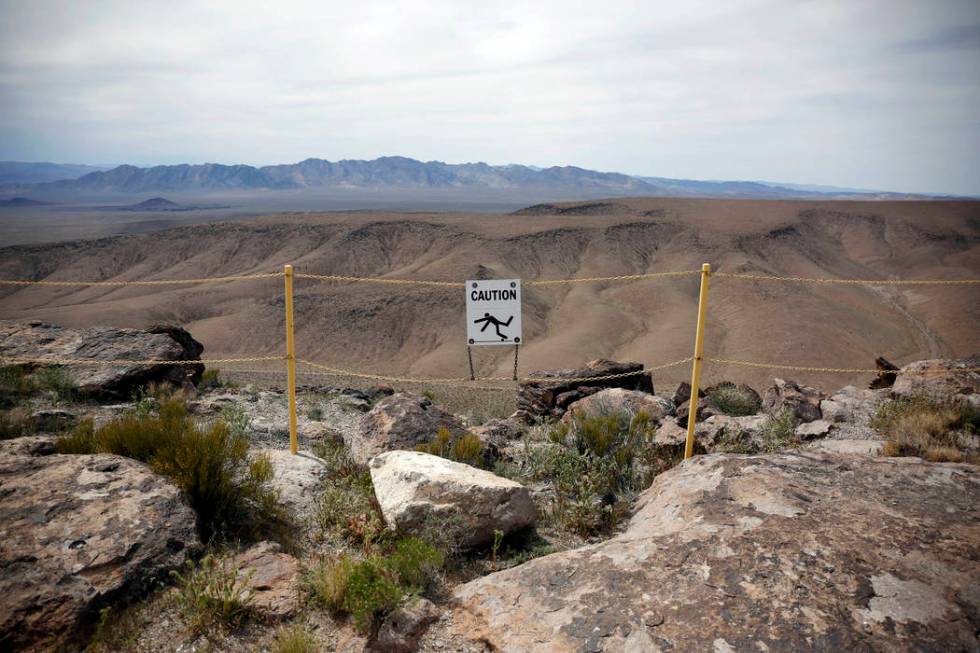Bill to expedite Yucca Mountain licensing clears 1st hurdle

WASHINGTON — A bill to expedite the licensing and development of Yucca Mountain nuclear waste site in Nevada was passed by a subcommittee Thursday, clearing the first hurdle for legislation expected to be taken up in the House this year.
The House Energy and Commerce subcommittee on environment approved the Nuclear Waste Policy Amendments Act on a voice vote. The bill now goes to the full committee for approval.
Rep. John Shimkus, R-Ill., the subcommittee chairman and author of the bill, said the legislation reforms nuclear waste management policy to ensure the federal government meets its legal obligation to dispose of spent nuclear fuel and high-level waste.
Yucca Mountain was determined by a congressional act in 1987 as the site for long-term storage.
The bill passed by the subcommittee “preserves” Yucca Mountain as the most expeditious path for spent nuclear fuel while authorizing interim and private storage “to provide optionality until Yucca Mountain is fully licensed and prepared to receive shipments.”
Amendments to create a pilot program for interim storage sites, and another addressing water rights, were withdrawn.
But Rep. Dina Titus, D-Nev., who is not on the committee, attended the hearing and spoke on the House floor later to denounce the bill as one that ignores serious challenges from Nevada, which has denied the federal government water rights to develop the site.
Titus said the bill “usurps the state’s water rights, one of our strongest legal defenses against the repository.”
During the hearing, the ranking Democrat on the panel, Rep. Paul Tonko, D-N.Y., agreed. He said the bill as written would “essentially override the state of Nevada’s objection over its water rights.”
Tonko said that would also draw opposition from lawmakers in other Western states, where water rights have been a long source of contention.
In addition, Titus said the legislation “ignores the fact that other states are willing — at this very moment — to store nuclear waste.”
Shimkus is moving ahead with the legislation citing a need to store waste produced by nuclear generators nationwide.
Spent fuel is accumulating in 121 communities in 39 states because of a lack of a permanent storage site, the legislation contends.
Senate’s version
The Senate is preparing its own bill to address nuclear waste storage with an emphasis on temporary sites to address the growing stockpiles of spent fuel and materials. That bill is expected to be filed in the coming weeks.
Sen. Lamar Alexander, R-Tenn., chairman of the Senate Appropriations subcommittee for energy and water development, said the bipartisan bill would address the need for interim storage, support development of Yucca Mountain and create an agency to seek additional storage sites.
Alexander and Sen. Dianne Feinstein, D-Calif., the ranking Democrat on the Senate appropriations subcommittee, noted that the Senate and House approaches differ widely.
If the bills advance in their respective chambers, those differences would need to be ironed out in a House-Senate conference committee, which would write final legislation.
The House bill mirrors the Trump administration call for a restart of licensing for Yucca Mountain. The president included $120 million in his budget blueprint for fiscal year 2018, which begins Oct. 1.
The Department of Energy first sought an application for a license with the Nuclear Regulatory Commission to develop and operate Yucca Mountain in 2008. The DOE tried to withdraw the application in 2010 and President Barack Obama defunded the program in 2012.
More than $15 billion has been spent studying the site and preparing for the licensing procedure, which includes adjudication of legal challenges.
200 challenges
Nevada has filed more than 200 challenges, mostly citing safety over groundwater and transportation issues.
Titus on Thursday handed lawmakers a state-produced research paper that showed moving nuclear waste to Yucca Mountain would cross through 329 congressional districts nationwide by rail or highway.
Yucca Mountain licensing also faces legal challenges in U.S. circuit courts.
Nevada Gov. Brian Sandoval this week reiterated his pledge that the state would oppose the Yucca Mountain project.
“The state of Nevada will continue to fight and defeat this dangerous project at every opportunity and in any venue,” Sandoval said in a statement.
Officials in Nye County, where Yucca Mountain is located, support the licensing process to determine whether the site is suitable for nuclear waste storage.
But even as legislation wends its way through Congress, development of the site, if approved, would be years away.
The NRC chairwoman told the Senate last week that the licensing process alone could take between three to five years.
Contact Gary Martin at 202-662-7390 or gmartin@reviewjournal.com. Follow @garymartindc on Twitter.